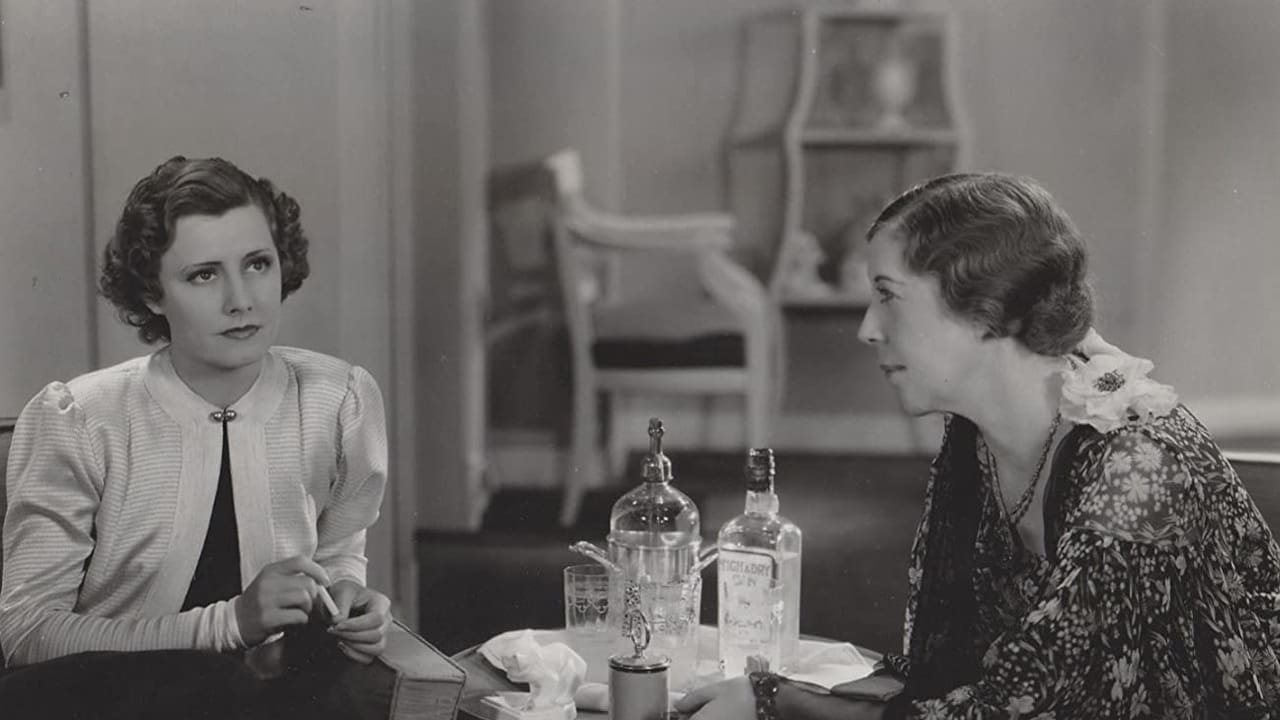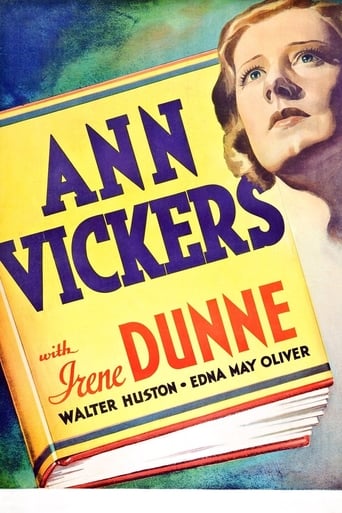



Intense, gripping, stylish and poignant
Fantastic!
Easily the biggest piece of Right wing non sense propaganda I ever saw.
View MoreThis is a small, humorous movie in some ways, but it has a huge heart. What a nice experience.
View MoreCopyright 28 September 1933 by RKO Radio Pictures, Inc. New York opening at the Radio City Music Hall: 28 September 1933 (ran one week). U.S. release: 13 October 1933. U.K release: 7 May 1934. Australian release: 21 March 1934. 9 reels. 72 minutes. NOTES: Irene Dunne was super-popular world-wide, though Ann Vickers was more successful in cities than the country; and in carriage and middle-class suburbs rather than working-class districts. COMMENT: Ann Vickers is the sort of movie I really like. Here we have a fast-moving plot, packed with incident; a sympathetic lead and interesting support characters; smart, witty dialogue; all abetted by stylishly inventive, pacy direction and highly polished photography. (Production values only fall down in a couple of minor matters, like the obvious use of models for the Stuyvesant Building and the clumsy superimposition of Irene Dunne's close-up over the prison scenes. Maybe this latter device was designed to disguise the fact that these scenes were extracted from the stock footage library; - but if so, they were darn good). Two photographers were employed, David Abel doing the bulk of the work like the lovely soft-focus close-ups, the dynamically-framed two-shots and the dramatic reverse angles of Miss Dunne; whilst Eddie Cronjager contributed the more high contrast material, such as the single take with Dunne and Oliver in the taxi. Dunne carries the bulk of the action. I think she is in every scene, though of course she does take a back seat as a spectator in the trial sequences. Attractively photographed, styled and dressed, Miss Dunne brings Sinclair Lewis' plucky heroine to sympathetic life. Led by Walter Huston and Edna May Oliver, the support cast is enlivened by a highly skilled array of players, including Bruce Cabot (in a small but meaty role), Gertrude Michael (making the most of her one brief scene), Edwin Maxwell, and especially Mitchell Lewis. It's easy to spot other favorites like Arthur Hoyt and Jane Darwell (both Stuyvesant board members), J. Carroll Naish (a nonspeaking bit as a drunken doctor), Irving Bacon (also no dialogue) as a waiter. Huston himself has only one brief scene in the first half of the film, but comes into his own in the second half where he plays with his usual feisty vigor. Unfortunately, Huston's self-confident and self-possessed sincerity is not echoed by Conrad Nagel who makes his part as Irene's social worker colleague, a little too prissy (though maybe this is true to Lewis' vision of the character). In any event, his role is small. Also mercifully brief is Rafaella Ottiano's impersonation of Irene's secretary at the Stuyvesant Home. Luckily, she doesn't come on until the latter half of the picture, but she's a bit hard to take, what with her constant facial grimacing that serves no purpose other than plain camera-hogging. Max Steiner has obliged with a melodic music score, the film editing is exceptionally adroit, the movie is always attractive to look at and often scintillating to hear. Perhaps one or two dull sequences, but all told, a lively and engrossing 72 minutes. OTHER VIEWS: Packed with incident, the movie seamlessly crosses the boundaries of a number of genres: The brutal prison scenes align with classic film noir, the wronged woman with traditional weepies, the final silver-lined clouds with storybook romance.
View MoreANN VICKERS is a bizarre tear-jerker from the early days of sound movies featuring IRENE DUNNE as a woman who is well-intentioned but makes all the wrong choices in life, including the men she thinks she loves.BRUCE CABOT is her first mistake, a man proclaiming great love for her but abandoning her not long after she bears his child. In a weak supporting role, she treats CONRAD NAGEL as a man she cannot love but values as a friend. He's not too happy about that arrangement.Then comes married man WALTER HUSTON, unhappily married who finds Dunne a refreshing bit of love interest. She has a career that keeps her busy and stands by him when he is accused of mismanaging funds. He's soon imprisoned but she finds a way to get his case some political attention and eventually he is free to marry her.That's about it, all handled in dreary fashion with hardly a note of music on the soundtrack to lift it out of the doldrums when it gets too soggy to bear. As social commentary on conditions in the 1930s and women's issues, it's a failure. Miss Dunne plays a social worker who rises to play an important role in the penal system for females.IRENE DUNNE suffers nobly, but it's a weak vehicle for a strong actress and she can do nothing to give the film a sense of real life struggles. Chalk this one up as a failure, even if it was based on a novel penned by no less than Sinclair Lewis. Evidently, not too much has been retained from his novel.Summing up: Not worth your time. Any film that wastes the talents of EDNA MAY OLIVER as a Duchess has got to make you wonder what they were thinking. It's her dullest role ever.
View MoreEssaying the title role in Ann Vickers, Irene Dunne who was never less than noble on screen manages to make a virtuous woman out of someone who has two illegitimate kids. Even in the days before the Code this was pretty heady stuff for Hollywood to be coming out with. Then again, novelist Sinclair Lewis was never anything but controversial in what he gave the American public. In fact his own relationship with newspaper columnist Dorothy Thompson parallels the one that Dunne has with Walter Huston in the film.We first meet Ann as a social worker at a settlement house before World War I where she has eyes for one special doughboy, Bruce Cabot even with lawyer Conrad Nagel panting hot and heavy for her. Cabot proves to be something of a rat and impregnates her, but the child is a stillborn.Ann is a role model feminist, a former suffragette who went to prison for the franchise. She's a career person first and she moves on to various jobs in the penal system, including running a women's prison. She becomes a best selling author and eventually falls in love with married judge Walter Huston with whom she has another child. Then Huston gets himself in a jackpot, but Irene also stands by her man. I've not read the Sinclair Lewis novel, but just viewing the film you could tell an awful lot was left out. Possibly a great deal of this film wound up on the cutting room floor. Edna May Oliver has a fine part as Dunne's mentor, but she's abandoned a third of the way through the film and we don't know what happened.Dunne does well in a role that Katharine Hepburn would have hit a home run with and she does get good support from the rest of the cast. Still this abbreviated version of Sinclair Lewis leaves a lot to be desired.
View MoreThis is what a woman's film ought to be in this era, not just 70 years ago. The Ann Vickers character is a strong woman devoted to her career and to those who depend on her at the women's prison. She is not without her flaws as any hero or protagonist, but she overcomes so many obstacles and definitely has control over her life. What has happened to strong and complex female roles in modern motion pictures? This movie is well acted, well-written and has a tremendous message. I recommend it to anyone who can get their hands on it, as I believe it is still not available on video. It ranks up there with Norma Shearer's character Jerry in "The Divorcee" as far as a well-developed complex strong female characters. We need more movies depicting our gender this way not just as sex objects but as sexual subjects, with career goals and sex drives. Watch this movie!
View More